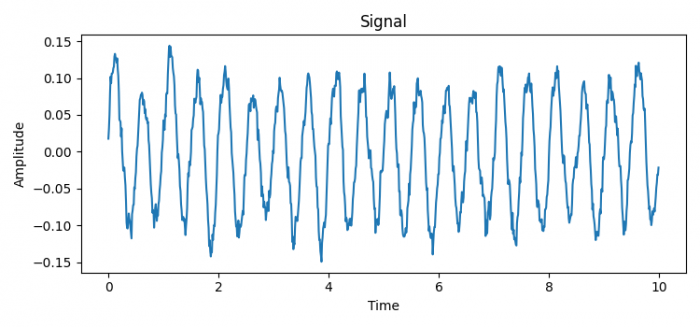
 Data Structure
Data Structure Networking
Networking RDBMS
RDBMS Operating System
Operating System Java
Java MS Excel
MS Excel iOS
iOS HTML
HTML CSS
CSS Android
Android Python
Python C Programming
C Programming C++
C++ C#
C# MongoDB
MongoDB MySQL
MySQL Javascript
Javascript PHP
PHP
- Selected Reading
- UPSC IAS Exams Notes
- Developer's Best Practices
- Questions and Answers
- Effective Resume Writing
- HR Interview Questions
- Computer Glossary
- Who is Who
How to plot signal in Matplotlib in Python?
To get the signal plot, we can take the following steps −
- Set the figure size and adjust the padding between and around the subplots.
- Get random seed value.
- Initialize dt for sampling interval and find the sampling frequency.
- Create random data points for t.
- To generate noise, get nse, r, cnse and s using numpy.
- Create a figure and a set of subplots using subplots() method.
- Set the title of the plot.
- Plot t and s data points.
- Set x and y labels.
- To display the figure, use show() method.
Example
import matplotlib.pyplot as plt
import numpy as np
plt.rcParams["figure.figsize"] = [7.50, 3.50]
plt.rcParams["figure.autolayout"] = True
np.random.seed(0)
dt = 0.01 # sampling interval
Fs = 1 / dt # sampling frequency
t = np.arange(0, 10, dt)
# generate noise:
nse = np.random.randn(len(t))
r = np.exp(-t / 0.05)
cnse = np.convolve(nse, r) * dt
cnse = cnse[:len(t)]
s = 0.1 * np.sin(4 * np.pi * t) + cnse
fig, axs = plt.subplots()
axs.set_title("Signal")
axs.plot(t, s, color='C0')
axs.set_xlabel("Time")
axs.set_ylabel("Amplitude")
plt.show()
Output


Advertisements
